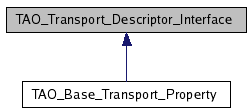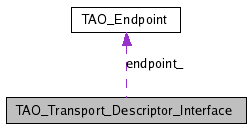TAO_Transport_Descriptor_Interface Class Reference
An abstract base class for Transport Property. More...
#include <Transport_Descriptor_Interface.h>


Public Member Functions | |
| virtual | ~TAO_Transport_Descriptor_Interface (void) |
| Destructor. | |
| virtual TAO_Transport_Descriptor_Interface * | duplicate (void)=0 |
| virtual CORBA::Boolean | is_equivalent (const TAO_Transport_Descriptor_Interface *other_prop)=0 |
| Try to determine if this object is same as the other_prop. | |
| virtual u_long | hash (void) const =0 |
| Generate hash value for our class. | |
| TAO_Endpoint * | endpoint (void) |
| Return the underlying endpoint object. | |
| CORBA::Boolean | reset_endpoint (TAO_Endpoint *ep) |
| void | set_bidir_flag (CORBA::Boolean flag) |
| Set the BiDir flag. | |
Protected Member Functions | |
| TAO_Transport_Descriptor_Interface (void) | |
| Default Constructor. | |
| TAO_Transport_Descriptor_Interface (TAO_Endpoint *endpoint, CORBA::Boolean take_ownership=false) | |
| Constructor. | |
Protected Attributes | |
| TAO_Endpoint * | endpoint_ |
| The base property of the connection ie. the peer's endpoint. | |
| CORBA::Boolean | bidir_flag_ |
| Should the endpoint be used in either direction? | |
| CORBA::Boolean | release_ |
Detailed Description
An abstract base class for Transport Property.This class provides an abstract interface and holds minimal info on which the Transport Caching scheme is based on. Concrete connection properties can be got by inheriting from this class and implementing the virtual functions. Note 1: Additional properties for connection like Qos, Priority that the RT folks would need, can be added by inheriting from this class and providing the following methods. 1. duplicate () 2. is_equivalent () 3. hash ()
Constructor & Destructor Documentation
| TAO_Transport_Descriptor_Interface::~TAO_Transport_Descriptor_Interface | ( | void | ) | [virtual] |
Destructor.
| TAO_Transport_Descriptor_Interface::TAO_Transport_Descriptor_Interface | ( | void | ) | [protected] |
Default Constructor.
| TAO_Transport_Descriptor_Interface::TAO_Transport_Descriptor_Interface | ( | TAO_Endpoint * | endpoint, | |
| CORBA::Boolean | take_ownership = false | |||
| ) | [protected] |
Constructor.
Member Function Documentation
| virtual TAO_Transport_Descriptor_Interface* TAO_Transport_Descriptor_Interface::duplicate | ( | void | ) | [pure virtual] |
This call allocates and copies the contents of this class and returns the pointer
Implemented in TAO_Base_Transport_Property.
| TAO_Endpoint * TAO_Transport_Descriptor_Interface::endpoint | ( | void | ) |
Return the underlying endpoint object.
| virtual u_long TAO_Transport_Descriptor_Interface::hash | ( | void | ) | const [pure virtual] |
| virtual CORBA::Boolean TAO_Transport_Descriptor_Interface::is_equivalent | ( | const TAO_Transport_Descriptor_Interface * | other_prop | ) | [pure virtual] |
Try to determine if this object is same as the other_prop.
Implemented in TAO_Base_Transport_Property.
| CORBA::Boolean TAO_Transport_Descriptor_Interface::reset_endpoint | ( | TAO_Endpoint * | ep | ) |
Reset the endpoint pointer to point to another, if that one is part of the chain based by the current endpoint. Although this method is public it should only be used by the protocol specific connector, right before caching, and only when a parallel connect was attempted with more than one possible endpoints.
| void TAO_Transport_Descriptor_Interface::set_bidir_flag | ( | CORBA::Boolean | flag | ) |
Set the BiDir flag.
Member Data Documentation
Should the endpoint be used in either direction?
The base property of the connection ie. the peer's endpoint.
Is the endpoint allocated on the heap? If so, we will have to delete it when we destruct ourselves.
The documentation for this class was generated from the following files:
 1.5.8
1.5.8